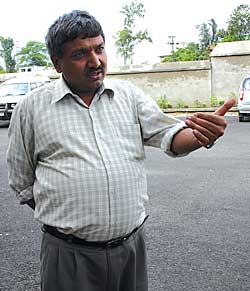Economist Dilli Raj Khanal is a close adviser to Finance Minister Bharat Mohan Adhikari, who is announcing the new budget on Friday. He told Nepali Times how this budget would be different from those in the past.
Nepali Times: How is this budget going  to be different?
to be different?
Dilli Raj Khanal: The basis for the budget is the Common Minimum Program agreed to by the four parties in the government. It talks about strengthening democracy, solving the Maoist problem, providing immediate relief to people, beginning reconstruction and making moves for social, political and economic changes. The budget will reflect these guidelines.
Is defence expenditure going up?
This year, we could not spend a major chunk of the development budget even though the allocation itself had been slashed. Development work in rural areas has been significantly hampered. The precondition to development spending is therefore bringing the rebels in for peace talks and ensuring rule of law and security. But there has to be a cap on security expenses. There are many unproductive expenses because of duplication under several heads. If we can save on those fronts, we can increase the scale of development expenditure.
Does that mean less money for security?
Going by what the finance minister has been saying, I think it will go down.
How much do you think we can save by checking the duplication you mentioned?
The savings will be significant. The finance minister will perhaps present the budget in the format of recurrent and capital expenditure. The format will check the duplication of expenses and that will help us save around Rs 5 billion in the next two to three years.
Will the format of the budget be different as well?
Normally, the regular budget is discussed at the Finance Ministry and the development budget at the National Planning Commission. Many headings under regular budget get repeated in the development budget. The old budget system does not check these duplications. The new scientific system will alert us about these and allow us to reduce unproductive spending.
Why not use the headings 'regular' and 'development' expenditure?
In many countries they don't divide the budget as regular and development. Expenses like overheads and interests are kept in recurrent expenditure. Under capital expenditure, we allocate money to, for instance, buying land, machinery, equipment and construction expenses. These expenses help in the accumulation of the country's capital and increase productivity. These expenses also include the salaries of teachers, engineers and doctors because they are taken as investment in human resources.
The finance minister has said this will be a 'peace budget'. What does that mean?
There is talk of strengthening the peace secretariat, which has been established at the prime minister's office. The process will need big budgetary support. The fact that the budget will be aimed at initiating a peace process will establish that this government is for solving the Maoist problem.
How about relief and rehabilitation?
We will need the help of community-based organisations to reach people in rural areas. This will also be an effective confidence building measure for peace talks with the Maoists.
What is the response of other parties in government to these plans?
They have no problems with it. The budget is being prepared with the common spirit of all the parties in the government.
Will the total budget amount be greater than last year?
Given inflation, the increased amount for debt servicing and the thrust of the Common Minimum Program of the coalition government, the figure will probably go up.


